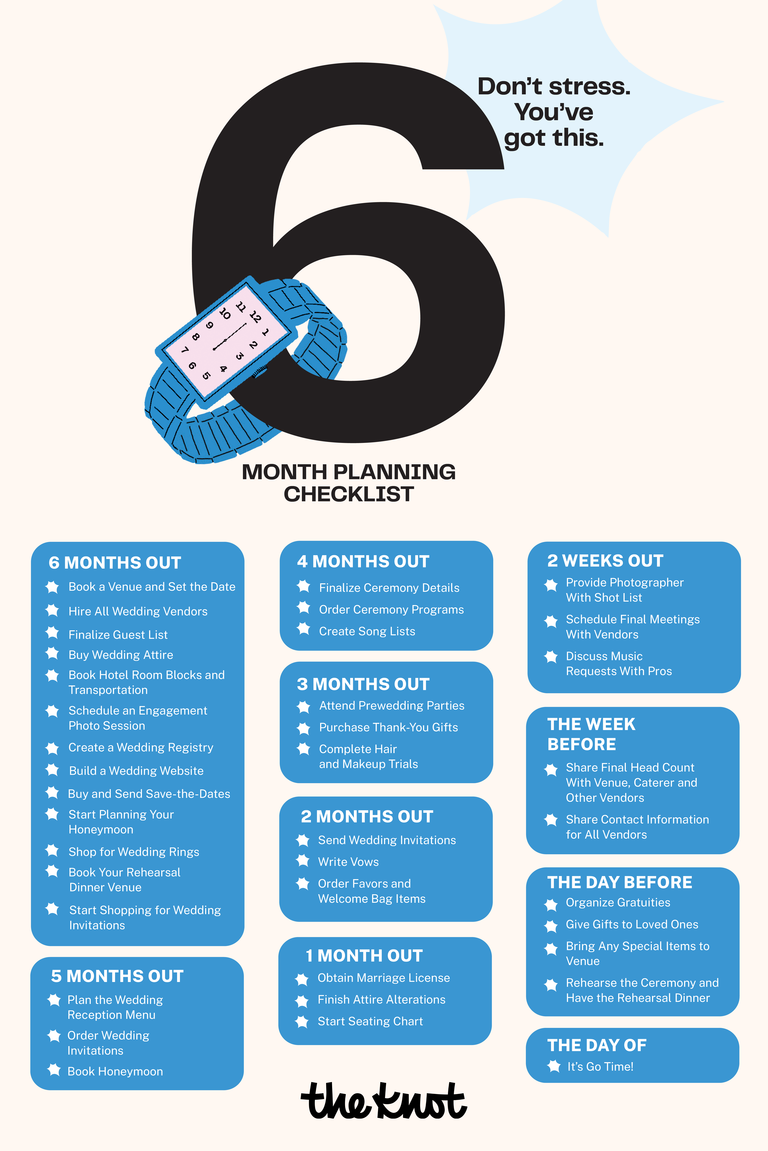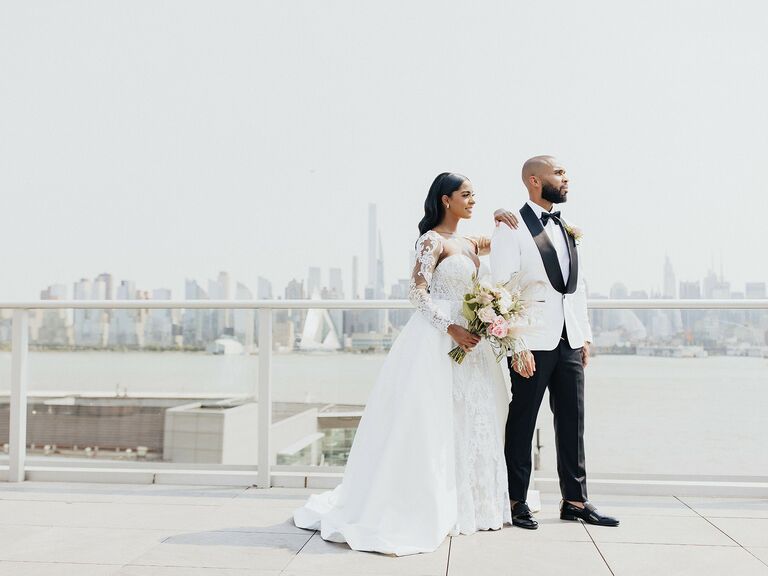How to Plan a Wedding in 6 Months (Yes, It's Totally Possible)
While the average length of an engagement in the U.S. is 16 months, 45% of couples spend less than a year planning their big day. There are a variety of reasons why couples may want to marry sooner, from work schedules to military deployments, family obligations to targeting a particular time of year. If you're set on a particular wedding day and have six months to plan, we've got you covered. Yes, there's a lot of wedding planning do in a short period of time, but by staying organized and on track, it's totally possible. We've got everything you need to plan a wedding in 6 months (or less!).
In this article:
- Can You Plan a Wedding in 6 Months?
- Printable 6-Month Wedding Checklist
- How Do I Start Planning a Wedding?
- How to Plan a Wedding in 6 Months
Can You Plan a Wedding in 6 Months?
Yes, it's absolutely possible to plan a wedding in six months (or even three months or less!). However, you won't have a ton of time to waste and you'll have to be flexible with all aspects of your planning journey—from setting a date to booking a wedding venue, selecting vendors to picking flowers, attire and more. And while most of your loved ones should be able to attend your big day, there may be certain family members and friends who can't attend on short notice. Your wedding planning process will be quite condensed, which means that you'll likely have to tackle a new task almost every day—no rest for the weary! But if your ultimate goal is to be married ASAP and you're not picky about every last wedding detail, then a short timeline may be right for you. Follow our wedding planning timeline below to ensure you get everything done with time to spare.
Printable 6-Month Wedding Checklist
If you're the type of person who prefers putting pen to paper, you'll love this printable 6-month wedding-planning checklist. Tasks are organized and simplified to make the process an absolute breeze—simply print it out and start planning!

How Do I Start Planning a Wedding?
First things first, give yourself some time to celebrate your engagement. Your families might throw you an engagement party or you might skip the formal pre-wedding celebration in favor of something more low-key. Either way, take a few days to relax and revel in the moment.
Once you're ready to start wedding planning, you'll need to answer a few high-level, but super important, questions. These answers will help inform your decision making throughout the planning process, so take the time to think them through:
- Where do we want to get married (general location, not venue)? Are we planning a destination wedding or an event closer to home?
- Who will help pay for our big day, or are we paying for everything ourselves? What is our total wedding budget? (Note: You'll have to sit down with all the people who are contributing financially to come up with this number.)
- What are our priorities when it comes to our wedding?
- What's our wedding style?
- Are we planning a big or small wedding? What's our estimated guest count?
- Do we have a particular month or specific wedding date in mind?
- Who will we include in our wedding party?
- Do we want to work with a full-service wedding planner? (We highly recommend this, especially if you're working with a tight timeframe.)
Once you've figured out the answers to these questions, sign up for The Knot so you'll have access to a suite of planning tools, including a wedding checklist, budget tool, guest list tool and wedding website builder. These tools will help you stay organized, which is particularly important if you have limited time. And by downloading The Knot's Wedding Planner app, you can plan from anywhere, at any time!
Ready to hit the ground running? Our six-month wedding planning checklist and timeline will take you step by step through the process.
How to Plan a Wedding in 6 Months
6 Months Out
1. Book a wedding venue and set the date.
Choosing a wedding venue is more than just finding a space to host your event. Once you've booked your venue, you've officially "set the date" for the big day—meaning you can move forward with many other wedding-planning tasks. You'll need to decide if you're booking a separate ceremony and reception venue, or hosting both events in the same place. You'll then want to check out The Knot Marketplace to compare venues in your wedding location, and narrow down your favorites.
When reaching out to venues you're interested in, ask about their availability. Knowing that you're working with a quick turnaround and given the current wedding boom, you might have to be flexible with dates (there are only so many Saturdays in a year, after all!). Remember that weekday weddings have certain advantages, and are worth considering. If you can, tour venues you're considering and ask questions before moving forward with signing a contract.
2. Hire all wedding vendors.
Now that your wedding date is official, you can start building your vendor team. The average couple hires 14 wedding vendors, according to The Knot Real Wedding Study, so it's best to start the hiring process as soon as you book your venue. And with The Knot Vendor Marketplace, you can read reviews, compare pricing and view photos from thousands of wedding vendors. These are the pros you should consider hiring for the big day.
- Wedding planner (if you haven't hired one already)
- Caterer (if your venue isn't all-inclusive)
- Florist
- Rentals company
- Photographer
- Videographer
- DJ and/or wedding band
- Wedding ceremony musicians
- Hair stylist and/or makeup artist
- Wedding cake baker
- Officiant
- Transportation company
3. Finalize guest list.
As you'll need to start notifying loved ones about your big day pretty soon, you'll want to nail down the guest list. The Knot's guest list tool will help you keep track of names, addresses, RSVP status, gifts and more.
4. Buy wedding attire.
In many cases, ordering wedding attire takes time—a wedding dress can take over six months to arrive, so it's best to start the shopping process ASAP. We recommend purchasing all attire, from bridesmaid dresses to groomsmen suits, wedding dresses, tuxedos and more, in the early stages of planning.
5. Book hotel room blocks and transportation.
If many of your guests will be traveling to your wedding location, you'll want to book room blocks at area hotels to ensure everyone has a place to stay. You'll also need to book transportation to and from your wedding venue. Providing transportation for the VIPs (wedding party members, immediate family) is a must, and it's a nice gesture to provide shuttle service for your guests as well, if your venue is not within walking distance to their accommodations.
6. Schedule an engagement photo session.
Celebrate this special time with an engagement photo shoot. Your photographer will take photos of you and your partner in non-wedding attire, and you can feature the images on your save-the-dates, wedding website or in your home.
7. Create a wedding registry.
A wedding registry is a wish list of gifts you and your partner would like to receive—and your loved ones will likely want to start buying you gifts soon after your engagement. The Knot Registry makes the registry process a piece of cake, allowing you to choose items from any store you'd like to create a registry that's totally unique and personalized.
8. Build a wedding website.
Your wedding website will serve as a hub for your wedding guests to find all the important information about your big day, from directions to wedding party bios, registry details to accommodations and travel assistance. The Knot's wedding websites offer lots of designs and customizations, making the process a breeze.
9. Buy and send save-the-dates.
While it's not mandatory to send save-the-dates (especially with a shorter engagement), we do recommend it. Your save-the-dates need not match the rest of your invitation suite, and require just a few bits of information—your names, the wedding date, the general location (city and state is fine), and your wedding website address.
10. Start planning your honeymoon.
If you're planning on taking your honeymoon shortly after the big day, you'll want to start thinking about it now. While you don't have to book anything just yet, starting the conversation and deciding where you'd like to visit and for how long will be helpful.
11. Shop for wedding rings.
Wedding bands are an important piece of jewelry, as you'll likely wear them every single day! Take the time to try on bands and find ones that suit your personal style and feel comfortable.
12. Book your rehearsal dinner venue.
Traditionally, the rehearsal dinner is hosted by the groom's family, but nowadays, anything goes. Once you've decided who's hosting, it's time to book the venue. Restaurants and hotels make ideal rehearsal dinner venues, as catering and other services are included.
13. Start shopping for wedding invitations.
We know, you literally just sent out the save-the-dates, but it's time to start browsing stationery for your invitation suite. Whether you work with a local stationer or an online retailer (may we suggest The Knot Invitations for affordable and stylish invitations), now's the time to start the process.
5 Months Out
14. Plan the wedding reception menu.
It's time to choose what your guests will eat on the big day. If you haven't already had a menu tasting with your caterer, schedule that appointment. You'll choose everything from hors d'oeuvres to entrees, desserts and more.
15. Order wedding invitations.
As part of the ordering process, you'll want to receive a sample invitation to make sure the design and wording are to your liking. When you're ready to move forward, don't forget to order some extra invitation suites just in case. And you'll also want to think about how you'll address all those envelopes, and how much postage you'll need.
16. Book honeymoon.
Whether you're opting for a full honeymoon or a shorter mini-moon, it's a good idea to book flights and/or accommodations sooner rather than later. And don't forget to request time off work for your wedding and honeymoon!
4 Months Out
17. Finalize ceremony details.
Work with your officiant to figure out your wedding ceremony order, which traditions you'll include and if you'll write your own vows or use traditional ones.
18. Order ceremony programs.
Now that you've figured out your ceremony order, you can purchase programs to hand out on the big day.
19. Create song lists.
While we don't recommend creating a full playlist (trust the experts on that), you can choose some special songs to play during your wedding day, from the processional song to the first dance, and more.
3 Months Out
20. Attend pre-wedding parties.
From the bridal shower to the bachelor and bachelorette parties, there are many pre-wedding events to attend. Your wedding party and family members will likely take care of the planning for these, so you can sit back, relax and celebrate!
21. Purchase thank-you gifts.
We highly recommend buying gifts for wedding party members and parents to thank them for their support. You don't have to splurge on these gifts, it's the thought that counts.
22. Complete hair and makeup trial.
If you'll have your hair and makeup professionally done for the big day, now's the time to do a trial run with your pros. Don't be afraid to speak up and let your pros know if you're not thrilled with something—better to course correct now than on the day of the wedding.
2 Months Out
23. Send wedding invitations.
Once your invitations are assembled, addressed and stamped, it's time to put them in the mail and await the RSVPs! We recommend sending your wedding invitations about eight weeks before the big day, with an RSVP deadline of about three weeks before the wedding day.
24. Write wedding vows.
If you and your partner are writing personalized vows, don't wait until the last minute. By writing your vows a few months before the big day, you'll have plenty of time to practice reciting them!
25. Order wedding favors and welcome bag items.
While giving out favors and welcome bags are totally optional, they're a nice way to show gratitude to your guests for attending your wedding. Check out The Knot Shop to find favors and other wedding essentials.
1 Month Out
26. Obtain marriage license.
Each state has different laws about obtaining a marriage license. Make sure you and your partner have researched these procedures so that you know when to start the marriage license process. If you or your partner will be changing your name, make sure you're clear on those rules as well.
27. Finish attire alterations.
After your attire comes in, it will likely need alterations. Work with the retailer or an alterations pro to schedule these fittings to make sure that everything fits perfectly for the big day.
28. Start seating chart.
As you're receiving RSVPs, start creating a seating chart to figure out where your loved ones will sit at the reception. If you're providing escort cards or displaying a seating chart, you'll want to provide table information to those who are creating these items.
2 Weeks Out
29. Provide photographer with shot list.
A few weeks before your wedding day, schedule a conversation with your wedding photographer to discuss must-take photos. Your photographer can help you figure out which groupings are necessary and when photo sessions will take place on your wedding day.
30. Schedule final meetings and conversations with wedding vendors.
As you approach your special day, it's important to make sure your wedding vendors are all on the same page with timing and responsibilities. If you've hired a wedding planner, they can be helpful with these last-minute conversations and coordination.
31. Discuss music requests with DJ, wedding band and ceremony musicians.
You'll also have a final conversation with your music pros to discuss your song selections. Again, there's no need to choose every song that will be played during your event—let the experts do what they do best!
The Week Before
32. Share final headcount with venue, caterer and other vendors.
Now that all of your guests have (hopefully!) RSVP'd, you can share the final guest count with your vendors. This is important so your caterer prepares enough food and the tables are arranged properly.
33. Share contact information with all vendors.
Create a list of your vendors' contact information and share it with your vendor team. Weddings can be unpredictable, and your vendors may need to reach out to each other on the big day. By giving your vendors as much information as possible, you'll be able to relax and enjoy the day and let them handle the rest.
The Day Before
34. Organize gratuities.
Many of your vendors will receive tips on the big day, so it's important to organize all of these amounts before your wedding (check out our vendor tipping cheat sheet to get started!). Your wedding planner, a family member or wedding party member can help with giving out the tips.
35. Give gifts to loved ones.
Thank-you gifts should be presented to their recipients either the day before or the morning of the wedding.
36. Bring any special items to wedding venue.
If there are any items you've DIY'd or purchased to feature at the event, bring them to the venue so they can be properly stored and displayed.
37. Rehearse the ceremony and have the rehearsal dinner.
A ceremony rehearsal will ensure that everyone knows when to walk and where to stand or sit on the big day. And if you're having a rehearsal dinner afterwards, enjoy the first celebration of your wedding weekend!
The Day Of
38. Get married!
All of the planning will be totally worth it. Enjoy your special day!
























